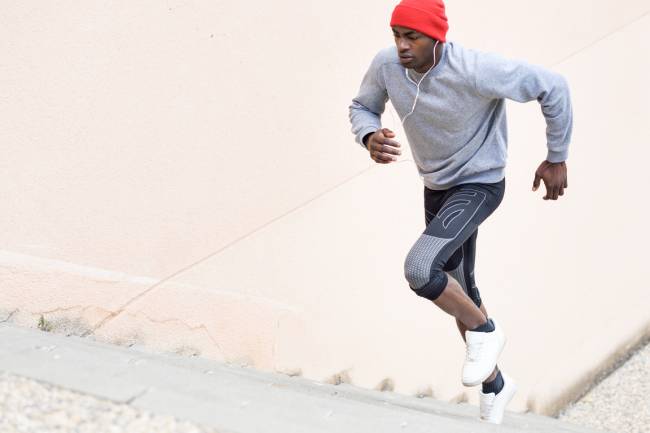Training can be hard at the best of times, but when it’s dreary, cold and dark – or even snowing – you need more motivation than ever to get to the gym or get out and moving. Double World Champion British rower and personal fitness trainer, Toby Garbett, shares his top tips for keeping in shape during the winter months…

“As a personal trainer and coach, I often find people let their fitness levels slip over the winter months, and regular exercisers become more sporadic,” says Toby. “Even as an Olympic and World champion rower myself, the thought of winter training when icy water splashes in and around the boat on wet, windy cold days is not inspiring. This can lead to an increased risk of injury as people forget that they are not in their peak summer fitness and often challenge themselves with similar intensity workouts, without the baseline fitness or warming up correctly. That leads to poor motivation with people feeling despondent about their fitness levels or injuries, and also has a negative impact on further training, as you wind up caught in a vicious cycle of recurrent injury and reduced fitness.”
Here are some of the most common barriers to exercising in winter, along with Toby’s top tips for addressing them:
1. Defeat the darkness
We all feel the need to hibernate a little over the winter months. Going for a run in the dark can feel less interesting and even less safe than doing so in the warm evening sun. I suggest teaming up with a buddy to do any form of outdoor evening fitness. If you have committed to meet up with someone, you’re less likely to back out. You’ll be safer in a group of two or more, and a weekly (or more!) meet up makes a boring work-out alone much more interesting.
2. Lift your mood
Many people suffer from seasonal affective disorder (SAD) to some degree in winter. This is when the nights draw in and we’re exposed to less sunlight, which can adversely affect our mood. This can lead to lower self-esteem and motivation, and makes us naturally less inclined to get out and exercise more. Interestingly, what we should be doing is the exact opposite, and exercising MORE! Exercise releases endorphins, which can have a positive effect on our mood, even after we’ve stopped exercising. I find when I explain to my clients that exercise can have a positive impact on not just their body but also their mind over the winter, they feel more able to engage with their fitness programme.
3. Combat the cold
We are naturally less inclined to get out and do our fitness when it is chilly outside, and it takes willpower not to curl up with a hot chocolate and the telly instead. One remedy to this would be to find an indoor fitness space, such as a gym, but it is also entirely possible to do a good workout at home without a lot of space, for example by doing a high-intensity programme. If you much prefer the outdoors, you could motivate yourself to get out there by treating yourself to some new winter fitness kit to wear. Good kit isn’t entirely about vanity though. When our muscles are cold, we are more likely to suffer injury, so investing in some quality winter fitness wear also makes good sense.
4. Have a goal
Over the summer, there are many sporting events to sign up to and challenge yourself with. These tail off significantly in the winter, so I would advise signing yourself up for a challenge in the spring, and write yourself a basic training programme which will help keep you motivated over the winter. Of course, this doesn’t have to be of the same high-intensity level you’d adopt immediately prior to an event, but it is important to maintain a baseline level of fitness on which to build as you get closer to the event.
5. Fuel your body
As an Olympic rower, I spent a lot of time out on the cold water, both at home in winter and overseas at altitude camps where the climate is colder. Cold weather inhibits your immune system which leaves us more prone to the illnesses which are naturally more prevalent in winter. I found a good way to attempt to address this problem and boost my own immunity was to eat a healthy diet rich in vitamins and other micronutrients.
Beetroot provides a good source of these, such as folate, potassium, vitamin C, phosphorous, iron, magnesium and zinc. It can also have a positive effect on your sports performance due to its high nitrate levels and studies indicate that it can help increase oxygen uptake for improved cardiorespiratory fitness. It is easy to add to your daily diet as it comes in many forms such as pickled, flavoured, roasted or raw, meaning you can keep up the interest and variety.

For more fitness tips from Toby Garbett, visit tobygarbett.com/







